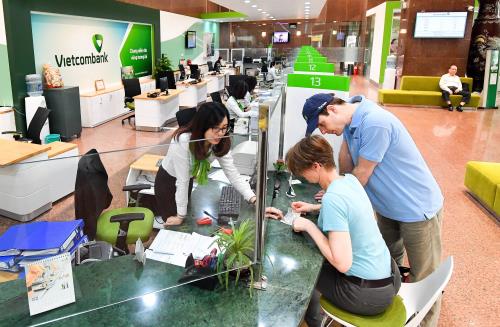 Economy
Economy


|
| Customers make transaction at a Vietcombank office in Hà Nội. The Vietnamese đồng is predicted to be less depreciation pressure compared to last year. — VNA/VNS Photo |
HÀ NỘI — Việt Nam’s exports and industrial output have increased in recent months as the country is considered a beneficiary of the US-China trade war, according to a VNDrect Securities Corporation (VNDS) report.
The report showed that export growth rebounded sharply in April, up 10.4 per cent year-on-year, while May’s industrial production index increased by 10 per cent year-on-year.
“Despite the step-up in trade tensions, we maintain our 2019 and 2020 GDP growth forecasts at 6.6 per cent and 6.5 per cent,” the VNDS said.
In the first four months of this year, Việt Nam’s export growth remained positive at 6.5 year-on-year compared with negative growth for other Asian countries, thanks to strong domestic exports, particularly textile, wooden products and solid growth in exports of tech products.
“In addition, FDI from China into Việt Nam nearly doubled from the same period last year. We see resilient export growth and robust FDI inflows providing the country with a buffer against further escalation in the US-China trade war,” according the report.
VNDS said that barring a full-scale trade war, this round of Chinese yuan depreciation would be no different compared to last year because a sharper depreciation could add more uncertainty to the trade negotiation process and was unlikely to help Chinese authorities.
“We see less depreciation pressure on the Vietnamese đồng compared to last year, thanks to better guidance from the State Bank of Việt Nam to the foreign exchange market and less funding pressure from strong US dollar given the Fed’s dovishness,” the VNDS added.
After Việt Nam was added to the US Treasury’s currency watch list for potential currency manipulation, VNDS said Vietnamese policy makers will be more cautious on currency management or intervention going forward.
“The country is becoming more vulnerable to US policy owing to the rising trade surplus with the US because many Chinese businesses have re-routed their goods to the US via Việt Nam to avoid tariffs,” the report read.
VNDS said although it expects muted inflation in 2019, it still see upside risks in the longer term due to a rebound in pork prices if African swine fever is contained and China’s growth stimulus measures are likely to boost demand for oil and raise oil prices amidst tighter global supply. — VNS




